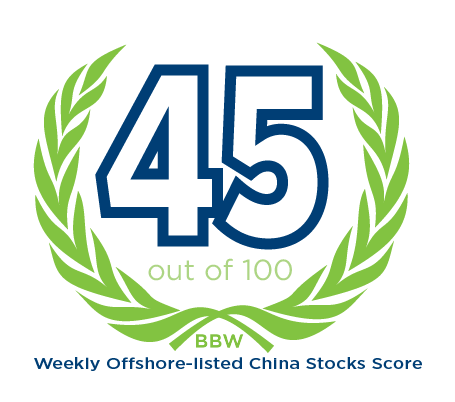CHINA BULLETIN: Manufacturing Déjà Vu


In this week’s issue European gloom, a new chip fund and foreign law firms flee Shanghai. On a scale of 1 to 100, we give the week a 45 for offshore-listed China stocks.
Doug Young, Editor in Chief
You can sign up to get China Bulletin weekly in your inbox.
MACRO
This year is shaping up quite like 2023, which started with an economic bang that quickly fizzled in the second half of the year. The latest signs that China’s improving economy was losing steam came in the latest PMI, which surprised observers by slipping into contraction territory in May. Specifically, the official PMI dipped to 49.5 last month from 50.4 in April.
At the same time, another quasi-indicator showed that China’s export machine is charging ahead, providing one of the economy’s few bright spots. That indicator is the large containers used to ship goods, which fell into short supply last month as manufacturers raced to export things like EVs and medical goods to the U.S. before recently announced U.S. protective tariffs are set to kick in.
European Business Leaders Glum Over China Ties
Meantime, the recent parade of gloomy business surveys continued last week with the latest poll from the European Round Table for Industry, which found a majority of respondents believed China-EU relations will worsen over the next three years. Some 54% of those surveyed said relations were likely to get worse, while only 7% expected improvement.
Europe and the U.S. are increasingly worried that China is using government subsidies to flood global markets with cheap goods in important emerging areas like electric vehicles and solar panels, to the detriment of their own companies. The EU has launched investigations into Chinese EVs over the topic, and any resulting penalties would almost certainly cast a chill over bilateral relations.
China Stocks Sag Some More
What goes up must come down, or so the saying goes. That was certainly the case for offshore-listed Chinese stocks, which fell for a second consecutive week after four weeks of solid gains that put them into bull territory. The Hang Seng China Enterprises Index fell 3.2% for the week, while the iShares MSCI China ETF and broader Hang Seng Index lost 2.6% and 2.8%, respectively.
Last week’s declines were a little smaller than a week earlier, indicating they may have been the tail end of a needed correction after the strong rally from the previous four weeks. We’ll need to wait to see if that rally is really sustainable or if the selloff continues. Despite the two weak weeks, the Hang Seng China Enterprises Index is still up 22% from its low in late January.

Industry
China Launches Third Mega Chip Fund
Chips anyone? We’re guessing the answer will be a resounding “yes,” as China set up its third massive fund to supporting its young semiconductor sector. This fund has a hefty 344 billion yuan in registered capital, equal to nearly $50 billion. Its top two contributors are China’s Finance Ministry and China Development Bank, a major policy bank.
This kind of huge money, combined with the previous two funds, makes recent U.S. efforts to boost its local chip industry look tiny by comparison. Then again, the U.S. support is far more targeted and likely to yield results than China’s efforts, which typically attract all kinds of fraudsters and wannabes who do whatever it takes to get their hands on these easy government funds.
Foreign Law Firms Rush for the Exit Door
A growing number of foreign law firms in China are heading for the exits, starved for business as the multinational companies that were their main clients slash their Chinese operations. The flight is most acute in Shanghai, China’s commercial capital, where the likes of Sidley Austin, Perkins Coie, Latham & Watkins and Orrick have all recently closed or said they will close their offices.
Law firms aren’t the only ones headed for the doors. We’ve also heard stories of global PR agencies, as well as business consultants scaling back or shutting down their China operations. All of these typically catered to foreign multinationals who were willing to pay their hefty fees, unlike Chinese companies that tend to go for cheaper local alternatives.
EU Delays Decision on Unfair Chinese EV Subsidies
The EU won’t announce results of its probe into unfair state support for China’s new energy vehicles (NEVs) until after upcoming EU Parliament elections on June 6-9. Many were expecting results next week, following an investigation that officially launched on Oct. 4. It was unclear if the delay was related to the election, or was perhaps due to technical issues.
While we’ll have to wait another week for the results, the commission seems all but certain to find against Chinese EVs, which have recently flooded Europe after a huge government-backed buildup of the industry in China. Local Chinese governments even went so far as to demand that one EV failure backed by bankrupt developer Evergrande repay $262 million it received in such support.

Company
Are they or aren’t they? That’s the question everyone’s asking about Apple in China, which is trying to fend off a challenge from a rebounding Huawei. Reports earlier this year indicated Apple was losing significant market share to Huawei in the latter’s home China market. But now new data are showing Apple’s China smartphone sales jumped in April, extending a rebound from March.
The government data didn’t cite Apple by name, saying only that shipments of foreign-brand phones rose by 52% in China in April year-on-year. But as the only foreign company among leading brands in the market, many assume that most of the increase came from higher iPhone sales. The rise seems quite large, and could reflect recent discounting by Apple to claw back market share.
We wrote earlier how big foreign law firms are fleeing China for lack of business. But global accounting powerhouse PwC is seeing a similar flight of some of its major clients in China for different reasons. The company has lost more than a dozen such clients for its auditing services, as it comes under the microscope for its role as auditor for bankrupt developer Evergrande.
PwC has been in an uneasy situation since regulators launched their investigation into any potential role it may have played in deceiving investors about Evergrande’s financial health. The case looks similar to a U.S.-based investigation in the early 2000s that ultimately led to the collapse of former auditing giant Arthur Andersen, though the results are unlikely to be as dire this time.
Vanke Sells Headquarters Project to Raise Cash
Evergrande wasn’t the only struggling developer making headlines last week. Vanke, also from South China’s Guangdong province, made news with word that it was selling a plot of land previously earmarked to become a sprawling new commercial complex including its own new headquarters in Shenzhen for 2.24 billion yuan, or about $300 million.
The price was nearly 30% less than the 3.1 billion yuan Vanke paid for the land back in 2017 when the real estate market was still booming. Unlike Evergrande, which has lost all its friends as its offshore assets get liquidated in a Hong Kong court, Vanke is a bit more financially stable, counting big government agencies in its hometown of Shenzhen as major shareholders.
AND FROM THE PAGES OF BAMBOO WORKS
| U.S. Lowers Pressure on WuXi Biotech Family Last week we brought you the story of how some sanity is returning in the recent U.S. war on China Inc. over concerns that dealing with Chinese companies poses a national security threat. Legislation that was rapidly moving through Congress to ban a family of contract medical service companies from the city of Wuxi has now been amended to have a longer timeline before implementation. The legislation targets BGI Genomics, WuXi AppTec and sister company WuXi Biologics, saying they have ties to the Chinese military and thus pose data security risks. The revised bill now gives U.S. companies an eight-year grace period to wean themselves from the Chinese firms, which is quite a long time for everyone to find a longer-term solution if the legislation actually passes. |
| China’s ‘Tinder’ Sinks on Fading Mood for Love On a lighter note, we also brought you the story of Hello Group, often called the “Tinder of China,” whose latest financial report shows how its three-year-old decline is accelerating. The company reached a peak in 2019, and it’s been downhill ever since, including a 9% revenue decline in this year’s first quarter. Even worse, the company predicted the rate of decline would accelerate. Hello Group was once an investor darling as it claimed the title of China’s leading dating site. But the pandemic put many Chinese out of the mood for love, and plunging birthrates haven’t helped either. Interestingly, the company hinted that new government incentives designed to encourage more marriages and childbearing could give it a future lift. |





